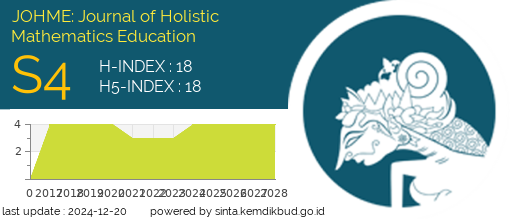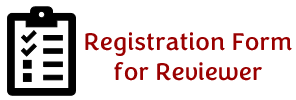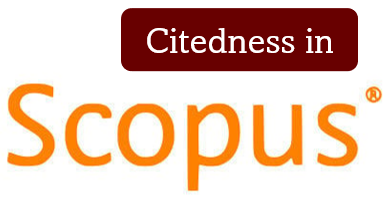EFEKTIFITAS BLENDED LEARNING MELALUI LMS MOODLE UNTUK MENINGKATKAN KEMANDIRIAN BELAJAR MAHASISWA PADA MATA KULIAH MATEMATIKA DI POLITEKNIK [THE EFFECTIVENESS OF BLENDED LEARNING USING THE MOODLE LMS TO IMPROVE POLYTECHNIC STUDENTS’ SELF-REGULATED LEARNING IN MATHEMATICS COURSES]
DOI:
https://doi.org/10.19166/johme.v6i1.5217Schlagworte:
blended learning, Moodle LMS, self-regulated learning, LMS Moodle, kemandirian belajarAbstract
The lack of self-regulated learning of a learner in a series of learning activities often hurts the achievement of their learning outcomes. It is necessary to provide a learning environment that supports an increase in one's self-regulated learning, which is through the application of blended learning. This study aims to look the effectiveness of the application of blended learning using the Moodle LMS in improving Polytechnic students’ self-regulated learning. This study applies a quantitative approach through the pre-experiment method and uses a One-Group Pretest-Posttest research design. This study compares the results of pretest and posttest on experimental class students after applying blended learning using the Moodle LMS. The research instrument analyzed was in the form of a non-test instrument which was arranged in a questionnaire. Statistical tests on research data were processed using SPSS 26 software. Wilcoxon nonparametric test results on questionnaire data gave results in the form of a significance value of 0.00 < 0.05 and the average N-gain value showed a value of 0.64. Through the results of statistical tests that have been carried out, it can be concluded that the application of learning with the blended learning model using the Moodle LMS has implications for increasing self-regulated learning for Polytechnic students with moderate effectiveness criteria.
BAHASA INDONESIA ABSTRACT: Kurangnya kemandirian belajar atau self-regulated learning seorang pembelajar dalam serangkaian aktivitas pembelajaran seringkali memberikan dampak yang buruk pada pencapaian hasil belajar mereka. Penyediaan lingkungan belajar yang mendukung peningkatan self-regulated learning seseorang perlu dilakukan, salah satunya melalui penerapan blended learning. Penelitian ini bertujuan untuk melihat tingkat keefektifan penerapan Blended Learning melalui LMS Moodle dalam meningkatkan self-regulated learning mahasiswa di Politeknik. Penelitian ini menerapkan pendekatan kuantitatif melalui metode Pre Eksperiment serta menggunakan desain penelitian One-Group Pretest-Posttest. Penelitian ini membandingkan hasil pretest dan posttest pada mahasiswa kelas eksperimen setelah diterapkan blended learning melalui LMS Moodle. Instrumen penelitian yang dianalisis berupa instrumen bentuk non tes yang disusun dalam sebuah kuisioner. Uji statistik terhadap data hasil penelitian diolah menggunakan software SPSS 26. Hasil uji nonparametric Wilcoxon terhadap data angket memberikan hasil berupa nilai signifikansi 0.00 < 0.05 dan rata-rata nilai N-gain menunjukkan nilai 0.64. Melalui hasil uji statistik yang telah dilakukan dapat disimpulkan bahwa penerapan pembelajaran dengan model blended learning melalui LMS Moodle berimplikasi dalam peningkatan self-regulated learning mahasiswa Politeknik dengan kriteria efektifitas sedang.
Literaturhinweise
Bahri, A., Idris, I. S., Muis, H., Arifuddin, M., & Fikri, M. J. (2021). Blended learning integrated with innovative learning strategy to improve self-regulated learning. International Journal of Instruction, 14(1), 779-794. Retrieved from https://files.eric.ed.gov/fulltext/EJ1282261.pdf
Bakhtiar, M. I. (2020). Tingkat self-regulated learning mahasiswa melalui pembelajaran blended learning berbasis aplikasi google classroom. Prosiding Seminar Nasional Lembaga Penelitian Universitas Negeri Makassar, 160-163. Retrieved from https://ojs.unm.ac.id/semnaslemlit/article/view/8523/4967
Bali, M. M., & Masulah, I. (2019). Hypnoteaching: Solusi siswa learning disorder. At-Turats, 13(1), 89-103. https://doi.org/10.24260/at-turats.v13i1.1188
Bhatti, A. H., Laigo, G. R., Gebreyohannes, H. M., & Kameswari, L. (2016). Using a blended learning approach in teaching mathematics. Proceedings of EDULEARN16 Conference Barcelona, 1366-1373. Retrieved from https://www.researchgate.net/publication/305704229_USING_A_BLENDED_LEARNING_APPROACH_IN_TEACHING_MATHEMATICS
Greenstein, L. (2012). Assessing 21st century skills: A guide to evaluating mastery and authentic learning. Thousand Oaks, CA: Corwin Press.
Hidayati, P. I. (2016). Optimalisasi pengembangan blended learning berbasis moodle untuk mata kuliah mikrobiologi. Jurnal Inspirasi Pendidikan, 6(2), 890-897. https://doi.org/10.21067/jip.v6i2.1328
Hoyles, C., & Lagrange, J. B. (2010). Mathematics education and technology-rethinking the terrain. New York, NY: Springer.
Lalima, & Dangwal, K. L. (2017). Blended learning: An innovative approach. Universal Journal of Educational Research, 5(1), 129-136. https://doi.org/10.13189/ujer.2017.050116
Latipah, E. (2017). Pengaruh strategi experiental learning terhadap self regulated learning mahasiswa. Humanitas, 14(1), 41-56. https://doi.org/10.26555/humanitas.v14i1.4547
Maghfiroh, L., Subchan, W., & Iqbal, M. (2016). Aplikasi problem based learning berbantuan moodle untuk menumbuhkan self regulated learning siswa dan meningkatkan hasil belajar siswa pada materi ekologi kelas X IPA 2 (SMA Negeri 3 Jember). Jurnal Edukasi, 3(1), 5-11. https://doi.org/10.19184/jukasi.v3i1.4312
Marlina, E. (2020). Pengembangan model pembelajaran blended learning berbantuan aplikasi Sevima Edlink. Jurnal Padegogik, 3(2), 104-110. Retrieved from https://jurnal.unai.edu/index.php/jpd/article/view/2339
Medina, L. C. (2018). Blended learning: Deficits and prospects in higher education. Australasian Journal of Educational Technology, 34(1), 42-56. https://doi.org/10.14742/ajet.3100
Meltzer, D. E. (2002). The relationship between mathematics preparation and conceptual learning gains in physics: A possible "hidden variable" in diagnostic pretest scores. American Journal of Physics, 70(12), 1259-1268. https://doi.org/10.1119/1.1514215
Pratiwi, I. R., & Silalahi, P. (2021). Pengembangan media pembelajaran matematika model blended learning berbasis moodle. AKSIOMA: Jurnal Program Studi Pendidikan Matematika, 10(1), 206-218. https://doi.org/10.24127/ajpm.v10i1.3240
Rosito, A. C. (2018). Kepribadian dan self-regulated learning. Jurnal Psikologi, 45(3), 189-199. https://doi.org/10.22146/jpsi.28530
Sari, A. R. (2013). Strategi blended learning untuk meningkatkan kemandirian belajar dan kemampuan critical thinking mahasiswa di era digital. Jurnal Pendidikan Akuntansi Indonesia, 11(2), 32-43. https://doi.org/10.21831/jpai.v11i2.1689
Schwab, K., & Sala, I. M. (2015). The global competitiveness report 2013-2014. Retrieved from https://www3.weforum.org/docs/WEF_GlobalCompetitivenessReport_2013-14.pdf
Soesanto, R. H., Rahayu, W., & Kartono. (2020). Keyakinan matematis dan kemandirian belajar mahasiswa pada program studi pendidikan matematika. JOHME: Journal of Holistic Mathematics Education, 4(1), 31-44. https://doi.org/10.19166/johme.v4i1.2637
Sucipto. (2017). Peningkatan self regulated learning mahasiswa di era digital melalui pembelajaran blended learning. Jurnal Ilmiah Soulmath: Jurnal Edukasi Pendidikan Matematika, 5(1), 31-41. https://doi.org/10.25139/sm.v5i1.455
Sudianto, Dwijanto, & Dewi, N. R. (2019). Students' creative thinking abilities and self regulation learning on project-based learning with LMS moodle. Unnes Journal of Mathematics Education Research, 8(1), 10-17. Retrieved from https://journal.unnes.ac.id/sju/index.php/ujmer/article/view/27183
Sugiyono. (2012). Metode penelitian kuantitatif, kualitatif, dan R&D. Bandung, Indonesia: Alfabeta.
Susetyo, Y. F., & Kumara, A. (2012). Orientasi tujuan, atribusi penyebab, dan belajar berdasar regulasi diri. Jurnal Psikologi, 39(1), 95-111. Retrieved from https://jurnal.ugm.ac.id/jpsi/article/view/6969
Tekeng, N. Y., & Alsa, A. (2016). Peranan kepuasan keutuhan dasar psikologis dan orientasi tujuan mastery approach terhadap belajar berdasar regulasi diri. Jurnal Psikologi, 43(2), 85-106. Retrieved from https://jurnal.ugm.ac.id/jpsi/article/view/22856
Toering, T., Gemser, M. T., Jonker, L., van Heuvelen, M. J., & Visscher, C. (2012). Measuring self regulation in a learning context: Reliability and validity of the self regulation of learning self-report scale (SLR-SRS). International Journal of Sport and Exercise Psychology, 10(1), 24-38. https://doi.org/10.1080/1612197x.2012.645132
Utami, S. R., Saputra, W. N. E., Suardiman, S. P., & Kumara, A. R. (2020). Peningkatan self-regulated learning siswa melalui konseling ringkas berfokus solusi. Counsellia: Jurnal Bimbingan dan Konseling, 10(1), 1-13. https://doi.org/10.25273/counsellia.v10i1.4730
Winagun, K. (2017). Pendidikan vokasi sebagai pondasi bangsa menghadapi globalisasi. Taman Vokasi, 5(1), 72-78. https://doi.org/10.30738/jtvok.v5i1.1493
Zariah, A. (2013). Pembelajaran regulasi diri pada santri di pondok pesantren modern. Surakarta, Indonesia: Universitas Muhammadiyah Surakarta.Downloads
Veröffentlicht
Zitationsvorschlag
Ausgabe
Rubrik
Lizenz
Authors who publish with this journal agree to the following terms:
1) Authors retain copyright and grant the journal right of first publication with the work simultaneously licensed under a Creative Commons Attribution License (CC-BY-SA 4.0) that allows others to share the work with an acknowledgement of the work's authorship and initial publication in this journal.
2) Authors are able to enter into separate, additional contractual arrangements for the non-exclusive distribution of the journal's published version of the work (e.g., post it to an institutional repository or publish it in a book), with an acknowledgement of its initial publication in this journal.
3) Authors are permitted and encouraged to post their work online (e.g., in institutional repositories or on their website). The final published PDF should be used and bibliographic details that credit the publication in this journal should be included.”










